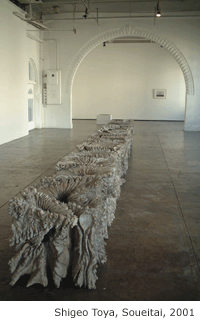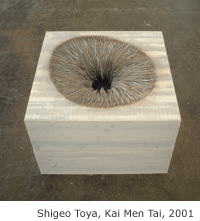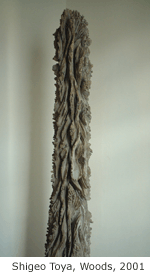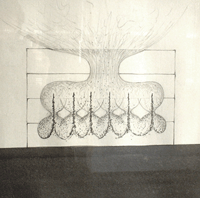Recent Sculptures
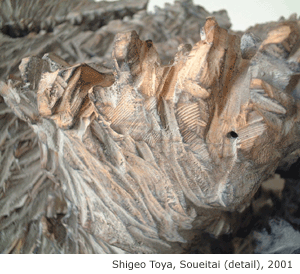
The sculptures of Shigeo Toya appear ancient, almost fossilized.
The ghostly ash wash he paints over the surface adds a final layer of
antiquity. In the pleasantly dilapidated surrounds of an old rice storehouse
in Saga, that is now the Rice Gallery, his works, three sculptures and
a number of drawings are comfortably at home.
The 9-meter long sculpture 'Soueitai (double image) gracefully reclines
in the middle of the large space. The large Roman arched windows of the
Gallery allow light to spill across the form revealing the scarred eroded
surface. Spreading from the central stem is coral like fans of wood. These
shapes which appear to have grown have in fact been formed by the gnawing
away of the huge log of wood with a chainsaw. No 'Friday the 13th type
chainsaw frenzy was at work here. Rather a careful and delicate whittling
away of the wood has revealed an intricate organic form.
Toya emerged with an important group of Japanese sculptors in the 1980s
to international acclaim for their post Monoha sculpture. That is, they
took the elemental materials, Zen-like aesthetic and primal forces such
as fire, as used by the Monoha movement, but added artistic process. Carving,
construction and coloring the work added an additional layer and reinserted
the hand of the artist into the sculpture.
Two other recent sculptures, 'Wood and 'Kai Men Tai are also on display.
'Wood is part of a long ongoing series of Toyas works. They are all
carved from large blocks of lumber and stand upright like a tree trunk.
Grouped together they form a forest and conjure up images of primeval
plants and trees.
A sense of time has long been a major theme in Toyas art. As early as
1979 he produced a work of scarred bricks titled Pompeii. Death and decay
in a geologic sense are interconnected themes in his work. It is the processes
of aging and its effects on surfaces that fascinate him. In Toyas hands
the chainsaw becomes -- time, scarring the surface and eating away the
decades.
The old rice storehouse is a centre for contemporary art not only housing
the Rice Gallery, a joint venture by Gallery Koyanagi and Shugoarts, but
also Tomio Koyama Gallery and Taro Nasu Gallery. The paint-peeling structure
with its central courtyard, gracious roman archways and panoramic roof
garden are a welcome experience in the general blandness of Tokyos city
buildings.
